North Carolina War Between the States Sesquicentennial
Republican Party the Cause of Secession and War

“If the Republican party accomplishes its objects and gives the government to the North,
I turn my eyes from the consequences. To the fifteen States of the South that government will
appear an alien government. It will appear a hostile government.”
(Rufus Choate to the Maine Whig State Central Committee)
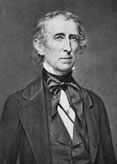
“It is quite sensibly felt by all, that the success of the Black Republicans would be the death knell of the Union.”
(Ex-President John Tyler)
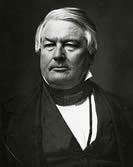
“We see a political party . . . with the avowed purpose of electing [their] candidates by suffrages
of one part of the Union only to rule over the whole United States. Can it be possible that those
who are engaged in such measure can have seriously reflected upon the consequences which must
inevitably follow in case of success? Can they have the madness or folly to believe that our
Southern brethren would submit to be governed by such a chief magistrate? . . .
We are treading upon the brink of a volcano that is liable at any moment to burst forth and overwhelm the nation.”
(Ex-President Millard Fillmore, Albany, NY, 1856)
“I have told you what we mean to do. I want to know, now, when [the Republican party triumph]
takes place, what you mean to do. I often hear it intimated that you mean to divide the Union
whenever a Republican or anything like it is elected President of the United States.
Are you going to split the Ohio down through, and push your half off a piece?
Or are you going to build up a wall some way between your country and ours . . . You have divided
the Union because we would not do right with you, as you think upon that subject; when we cease
to be under obligations to do anything for you, how much better off do you think you will be?
Will you make war and kill us all?
You will never make much of a hand at whipping us. If we were fewer in numbers than you,
I think you could whip us; if we were equal, it would likely be a drawn battle; but being inferior
in numbers, you will make nothing by attempting to master us.”
(Presidential candidate Lincoln to the Illinois State Republican Convention, 10 May 1859)

Republican leaders bent upon pushing the South to war scuttled the Crittenden plan
as they feared a national referendum which would welcome peaceful compromise.
The Core of the Anti-Republican Argument
“Thurlow Weed had been predicting since November [1860] that if the Republicans could make
the Union rather than slavery the central issue of the [sectional] crisis, a united North would rally
behind him. He . . . did not hesitate to urge Lincoln to take advantage of the sudden outburst
of patriotic fervor. From New York he told the president-elect, “We shall have a United north –
a condition about which I have been filled with solicitude.”
[But] the imminence of war stirred a desperation for peace . . . and conciliationist leaders launched
another offensive, spearheaded once more by Senators Crittenden and [Stephen] Douglas. Despite
Republican opposition . . . the encouragement they had had been receiving across the North and
Upper South convinced them that Northern public sentiment was behind compromise,
particularly the Crittenden plan.
With that support in mind, the two senators issued a joint letter assuring concerned Southerners
that their rights could be secured in the Union. On January 3, citing numerous reports of massive
public sympathy for a peaceful resolution to the crisis, Crittenden asked the Senate to refer his
amendments to the people, to be decided upon in national convention. He also sought to attract
Republican support by adding two propositions drawn from Douglas’s failed proposal:
a national ban on black voting and officeholding, and federal subsidization of black colonization to Africa.
[Douglas] charged the [uncompromising] Republicans with “attempt[ing] to manufacture partisan capital
out of a question involving the peace and safety of the country.” Worse, they refused to help resolve
the horrific crisis even though it was their own actions that had caused it . . . [and attacked them] for
being naïve ideologues: for all their talk of upholding the Constitution and enforcing the laws, he stormed,
they had to deal with the basic fact that “the revolution is complete.”
“In my opinion South Carolina has no right to secede,” he declared, “but she has done it.”
The question now was not how to prevent disunion but how to reverse it – by force of arms or by
a peaceful resolution of sectional differences?
Here Douglas reached the core of the anti-Republican argument.
“Are we prepared in our hearts for war with our own brethren and kindred?” he demanded.
“I confess I am not . . . I will not meditate war, nor tolerate the idea, until every effort at
peaceful adjustment has been exhausted . . . I am for peace to save the Union.”
(Lincoln and the Decision for War, the Northern Response to Secession, Russell McClintock,
UNC Press, 2008, pp. 111; 115)
A Declaration of War Upon the Constitution
“As had been foreseen, and, indeed, as was the inevitable sequence to the disruption of the
Democratic party, Abraham Lincoln, the candidate of the Republican party, was, in November, 1860,
elected President of the United States. This was the supreme and sufficient incitement to the
adoption of the dreaded resort of disunion. As the occasion which finally brought the South to the
attitude of resistance, the event acquires vast historical importance.
When it is conceded that Mr. Lincoln was elected in accordance with the forms of the Constitution,
having received a majority of majority of electoral votes; that the mere ceremony of election was
attended by no unusual circumstances, we concede every possible ground upon which can be based
an argument denying its ample justification of the course pursued by the South. Such an argument,
however, leads to a wholly untenable conclusion, and may be easily exposed in its
hypocritical evasion of the real question.
We are here required to note the distinction between cause and occasion. As the final consummation
of tendencies, long indicating the result of disunion, this event has an appropriate place in the recapitulation
of those influences, and can be rightly estimated only in connection with their operation.
So far as a verdict – from whatever tribunal, whether rendered at the bar of justice or in the award
of popular opinion, when the embers of recent strife are still fiercely glowing – can affect the
dispassionate judgment of History, the Southern people can not be separated, either in fact or
sentiment, from Jefferson Davis.
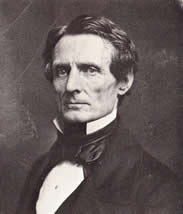
He was the illustrious compatriot of six millions of freemen, who struck for nationality and
independence, and lost – as did Greece and Poland before them; or he and they were alike insurgents,
equally guilty of the crime of treason.
With an adroitness which does credit to the characteristic charlatanism of the North, an infinite variety
of special questions and side issues have been interwoven with the narrative of the late war, for the
obvious purposes of confounding the judgment of mankind regarding the great question which really
constitutes the gravamen of the controversy.
Conspicuous among these efforts, from both audacity and plausibility, are appeals to the sympathies
of the world, in consideration of the abolition of slavery, which it is well known was merely an incident,
and not an avowed design of the war.
Persistent in its introduction of the moral question of slavery, the North seeks to shield itself from the
reproach justly visited upon its perpetuation of an atrocious political crime, by the insolent intrusion
of a false claim to the championship of humanity. Whatever may be the decision of Time upon the merits
of slavery, it is in vain for the North to seek escape from its responsibility for an institution, protected
and sustained by a government which was the joint creation of Southern and Northern hands.
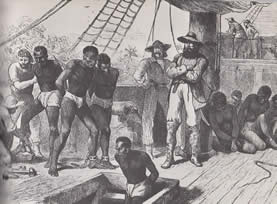
New England Slave Ship
The South did not appeal only to the inalienable right of revolution, which is the natural guarantee of
resistance to wrong and oppression. Nor did the States, severally, as they assumed to sever their
connection with the Union, announce a revolution of constitutional revolution, or adopt
a course inviting or justifying violence.
Mr. Davis and those who cooperated with him, neither by the acts of secession, not the
subsequent confederation of the States under a new government, could have committed treason
against Mr. Lincoln, since they were not his subjects. Nor were they traitors to the Government of
the United States, since the States of which they were citizens had rescinded the grant of powers
voluntarily made by them to that Government, and begun to exercise them in conjunction with other
powers which they had withheld by express reservation.
It is impossible to conceive a movement, contemplating such important political changes, more entirely
unattended by displays of violence, passion and disorder. A simple assertion, with due solemnity, by
each State, of its sovereignty – a heritage which it had never surrendered, but which had been respected
by innumerable forms of recognition in the history of the Union – and the exercise of those attributes of
sovereignty [and including] the peaceable method resorted to of terminating a political alliance which
had become injurious to the highest interests of one of the parties.
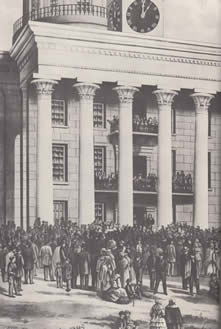
Could there have been a more becoming and dignified exercise of the vaunted right of self-government?
It is that right to which America is so conspicuously committed, and which has been such an inexhaustible
theme for the tawdry rhetoric of Northern eloquence.
Even in the insolence of its triumph, the North feels the necessity of at least a decent pretext for
its destruction of the cardinal feature in the American system of government – the sovereignty
of the States. With habitual want of candor, Northern writers pretend that the Constitution of the
United States does not affirm the sovereignty of the States, and that, therefore, secession was
treason against that Constitution to which they had subscribed; in other words, the created does
not give authority to the creator – i.e., the Constitution, which the States created, does not
accredit sovereignty to the States, and, therefore, the States are not sovereign.
Volumes of testimony have been adduced, proving the theory of State sovereignty to have been the
overwhelmingly predominant belief among the statesmen most prominent in the Union, and in shaping
the policy of the Government in its earlier history. Argument proved an unavailing offset to the stern
decrees of the sword, and is quite unnecessary so long as the unanswerable logic of Calhoun,
Davis, and a score of Southern statesmen remains upon the national records – a perpetual challenge,
as yet unaccepted, to the boasted intellect of the North, and a significant warning of
the final adjudication of the centuries.
In the Virginia Convention which ratified the Constitution, [later Chief Justice John Marshall] said:
“The State governments did not derive their powers from the General Government. But each government
derived its power from the people, and each was to act according to the powers given it. Would any
gentleman deny this? . . . Could any man say that this power was not retained by the States,
since it was not given away?”
In deference to the accumulated evidence upon this subject, came the unqualified statement,
from eminent Northern authority [William Rawle of Philadelphia], that, “This right [of secession] must
be considered an ingredient in the original composition of the General Government, which, though
not expressed, was mutually understood.”
Even Mr. Lincoln, whose statesmanship is not likely to be commemorated for its profundity or
scholarship, fully comprehended the exaggerated reverence of the American mind for the “sacred right
of self-government.” Now that his homely phrases are dignified by the Northern masses with the
sanctity of the utterances of Deity, assuredly there should be no apprehension that his opinions
may not be deemed conclusive. In 1848, Mr. Lincoln said: “Any people whatever have the right to
abolish the existing government, and form a new one that suits them better.
This is most valuable, a most sacred right.”
A brave affirmation was this of the doctrine of the Declaration of Independence, that
“Governments derive their just powers from the consent of the governed;” and one which would
have commanded the united applause of the North, then and now, had the application concerned
Hungary, Poland, Greece, or Mexico. But with reference to the South, there was a most important
modification of this admirable principle of equity and humanity.
When asked, “Why not let the South go?” Abraham Lincoln, the President, in 1861, said:
“Let the South go! Where, then, shall we look for the bounties and monopolies which have so
enriched us at the expense of those improvident, unsuspecting Southerners?
Where shall we find again such patient victims of spoliation?”
Mr. Horace Greeley [of the New York Tribune] frequently and emphatically, previous to the war,
affirmed the right of changing its political association asserted by the South. [He stated that:] . . .
whenever any considerable section of our Union shall deliberately resolve to go out, we shall resist
all coercive measures designed to keep it in. We hope never to live in a Republic whereof
one section is pinned to another by bayonets.”
On the 17th of December, 1860, the Tribune said: “If it [the Declaration of Independence] justifies
the secession of three millions of colonists in 1776, we do not see why it would not justify the
secession of five millions of Southerners from this Federal Union in 1861.”
Such are a few illustrations, to which might be added innumerable quotations, of the same import,
from the most prominent sources of Northern opinion. Never has there been a question so capable
of positive solution and easy comprehension, when subjected to the test of candid investigation,
and never so successful a purpose to exclude the illumination of facts by
persistent and ingenious misrepresentation.
There was no room for uncertainty as to the significance of the election of Abraham Lincoln
to the Presidency, in 1860, by a party exclusively sectional in organization, and upon a platform,
which virtually declared the Union, as then constituted, in opposition to justice, humanity and civilization.
The real danger to the South, involved in this election, was that it was a sectional triumph – a victory
of North over South, in a contest where the South risked every thing, the North nothing. From time
immemorial sincere patriots of both sections had deprecated the formation of sectional parties,
organized upon geographical interests, or upon ideas confined to limited portions of the Union.
Washington, in his farewell injunction, admonished his countrymen of the deplorable results
which must follow the presentation of such issues.
The Chicago platform was more than a menace to the South; it was a defiance of law, a declaration
of war upon the Constitution. The election of Lincoln was both a legal and moral severance of the
bonds of Union. While he received the united vote of the north, save New Jersey, he did not receive
one electoral vote from the South.
His shaping of his administration was consistent with the character of the party which elected him.
All his constitutional advisors were Northern men or Southern Abolitionists; social outlaws in their
own section, in consequence of their notorious personal depravity, and infidelity to their immediate
fellow-citizens. Of like character were the subordinate appointments of the Federal
Government in Southern communities.

Nor was there reason to doubt the policy of the Government under its new management.
Mr. Lincoln had been sufficiently communicative of his own bitter hostility to Southern institutions.
In fact, with much show of justice, his admirers claimed for him the original suggestion of the idea
of an “irrepressible conflict,” afterwards so elaborately pronounced by William H. Seward.
Public announcements, from prominent speakers of the successful party, amply revealed the feast
to which the South was invited. Wendell Phillips, the most able, eloquent, and sagacious of the original
Abolitionists, thus pointedly defined the situation: “No man has a right to be surprised at this state
of things. It is just what we have attempted to bring about. It is the first sectional party ever organized
in this country. It does not know its own face, and calls itself national; but it is not national –
it is sectional. The Republican party is a party of the North pledged against the South.”
Such was the complexion to which political affairs were brought by the election of Abraham Lincoln.
There remained hardly a hope, even for future security or domestic tranquility to the South, except
in withdrawal from an association, in which she had become an inferior and outcast – an object
of oppression, outrage and contumely.
From a relentless Abolition majority she could expect no favors; and from Northern Democracy,
so long her ally, for common purposes of party, had cowered before the storm of fanaticism,
and repudiated the first demand made upon its fidelity to principle.
The sixth of November, 1860, was the ominous day upon which the revolution, so long threatened,
and so often deferred by Southern concession and sacrifice, was inaugurated. Upon that day,
with the election of Abraham Lincoln, was opened a new volume of American history.
Upon that day, the American Union, “formed to establish justice,” resting upon the principle of equality
as its foundation-stone, passed under the control of an arrogant majority, pledged to its perversion,
to the oppression of nearly one-half its members. From the profession of fraternity, and the outward
pretense of comity, it passed under the dominion of principles whose origin was discord
and whose logical result was dissolution.
The answer of those who were threatened most seriously by the subversion of the Government
of their fathers . . . was worthy of men – the descendants of the authors of American Independence,
and educated in that political school which teaches the assertion of the rights
of the few against the power of the many.
That secession was not a revolutionary movement, but merely the necessary defense of a people
threatened with material ruin and political degradation, by a revolution which had already been
consummated, was amply demonstrated by its immediate consequences. The Confederate
leaders, at Montgomery, exhibited an almost religious veneration for the spirit, forms and
associations of the government which they had abandoned.
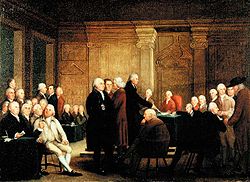
[The Confederate Constitution] was a signal improvement upon the original American Constitution,
and the few alterations made were commended by enlightened and conservative intellects every-
where, as necessary changes in the perfection of the American polity. The object sought . . .
was to embody every valuable principle of the old Constitution with certain remedial provisions
for the correction of obvious evils, which experience had fully indicated.
Informed of his election [to the Presidency], Mr. Davis immediately left his home for the
seat of government. Along the route to Montgomery he was greeted, by the people, with every
possible demonstration of patriotic enthusiasm and personal regard.
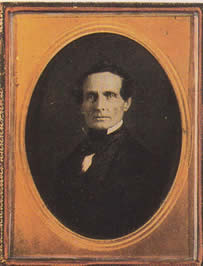
Proud, indeed, must ever be, to the Southern people, the contrast of the noble bearing of their
chosen ruler with the display of vulgarity attending the journey of Mr. Lincoln from Springfield
to Washington. These two men – the one with the calm dignity of the statesman and the polished
bearing of the gentleman; the other with coarse jests and buffoonery, upon the eve of the
most important event in their individual history, and pregnant with significance to millions –
were no bad indices of the civilization of their respective sections.
President [Jefferson] Davis was at all times solicitous for peace, and adopted every expedient
of negotiation that could promote that end. Heartily responding to the wishes of the Congress and people
of the Confederacy, he appointed, in February, an embassy to the Government at Washington.
The resolution of the Congress, asking that the embassy should be sent, explains its object to be
the “negotiating friendly relations between that Government and the Confederate States of America,
and for the settlement of all questions of disagreement between the two governments upon principles
of right, justice, equity and good faith.”
Two of these commissioners, Messrs. Crawford and Forsyth, arrived in Washington on the
5th of March [1861] . . . [and] waited to the 12th of March before making an official presentation
of their mission [to Secretary of State] Seward . . .
Here begins a record of perfidy, the parallel of which is not to be found in the history of the world.
Mr. Seward, while declining to recognize the Confederate commissioners officially, yet frequently
held confidential communication with them, by which the faith of the two Governments was fully pledged
to a line of policy, by what should certainly be the strongest form of assurance –
the personal honor of their representatives.
In verbal interviews, the commissioners were frequently assured of a pacific policy by the
Federal Government, that Fort Sumter would be evacuated, that the status at Fort Pickens
should not be changed, and that no departure from these pacific intentions would be made
without due notice to the Confederate Government.
It was alleged that formal negotiations with [the Confederate commissioners], in an official
capacity, would seriously jeopardize the success of Mr. Lincoln’s manipulation of public sentiment
at the North, which, it was further confidentially alleged, he was sedulously educating to
concurrence with his own friendly purposes toward the Confederates.
By this cunning device and the unscrupulous employment of deception and falsehood in his interviews
with the commissioners, Mr. Seward accomplished the double purpose of successful imposition
upon the credulity of the commissioners and evasion of official recognition of the Confederate embassy.
In the meantime . . . the Lincoln administration was secretly preparing hostile measures, and,
as was clearly demonstrated by subsequent revelations, had never seriously entertained any of the
propositions submitted by the Confederate Government. Resolved not to evacuate Fort Sumter, the
Federal Government, while amusing the Confederate commissioners with cunning dalliance,
had for weeks been meditating the feasibility of reinforcing it.
Never had a Government so auspicious an opportunity to save the needless effusion of blood,
and to avert indefinitely, if not finally, the calamity of war.”
Source:
The Life of Jefferson Davis, Frank H. Alfriend, National Publishing Company, 1868,
pp. 192-197; 206-208; 234-239; 259-261
Copyright 2014, The North Carolina War Between the States Sesquicentennial Commission